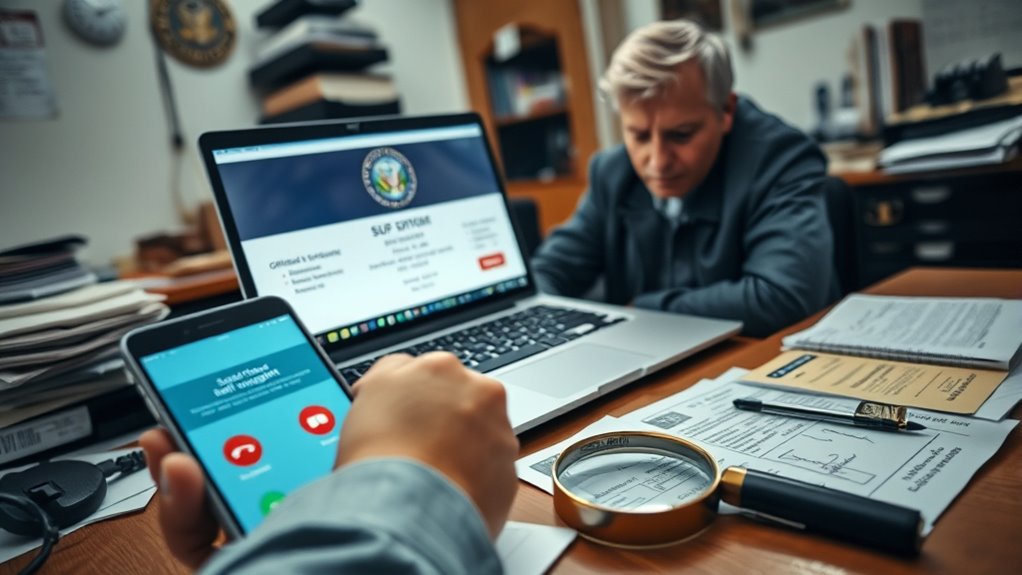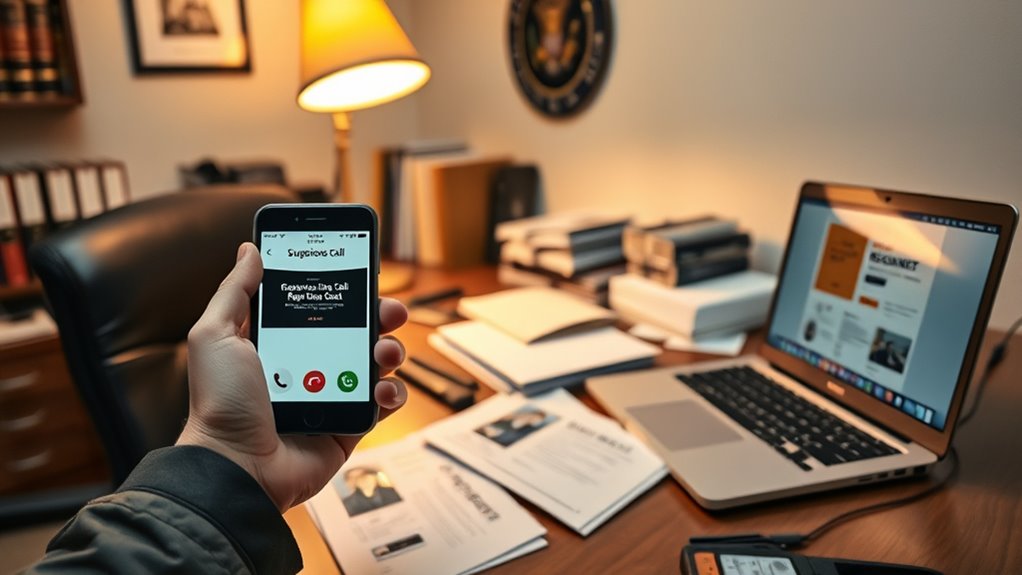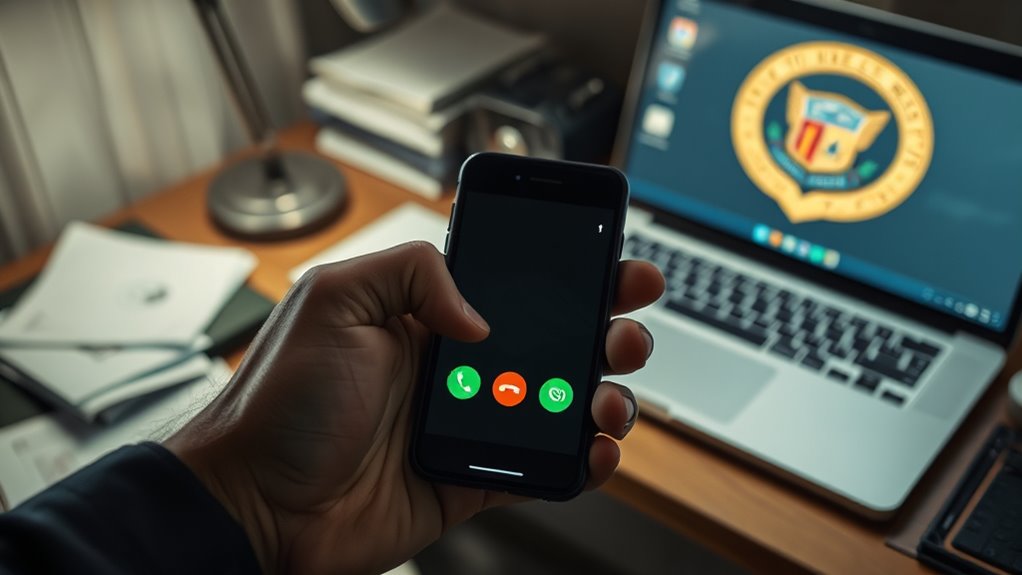If you’re contacted by a fake government agent, start by spotting red flags like urgent language, suspicious requests for money, or fake documents. Always verify their identity by contacting official agencies directly through trusted sources before sharing any personal info. Don’t send money or give sensitive details. Report the scam to authorities such as the FBI or FTC and keep detailed records. Staying vigilant and following these steps can protect you—and more tips are available if you keep looking.
Key Takeaways
- Do not share personal or financial information until you verify the caller’s identity through official government channels.
- Independently contact the relevant government agency using trusted contact details to confirm any claims or requests.
- Report the incident to authorities such as the FBI, FTC, or local law enforcement to aid investigations.
- Keep records of calls, messages, and documents received from the impersonator for evidence.
- Stay informed about common scam tactics, including AI-driven impersonations and phishing, to recognize red flags early.
Recognize Common Red Flags of Fake Government Agents

Fake government agents often try to appear legitimate by using tactics that trigger suspicion. They may spoof caller IDs to show official government numbers, making it seem trustworthy. Watch out for urgent or threatening language designed to scare you into quick action, like arrest or fines. They often ask for unusual payments, such as gift cards, wire transfers, or cryptocurrency, because these are hard to trace. They might also insist you keep the communication secret, especially from lawyers or law enforcement. Additionally, beware of fake or low-quality documents lacking proper agency details or official seals. Recognizing these red flags helps you stay alert and avoid falling for scams. Always remember that legitimate agencies won’t pressure you or demand secrecy or payment on the spot. Understanding scam tactics can further help you identify potential fraud attempts and protect yourself. Moreover, understanding official communication procedures can also help distinguish genuine government contacts from fraudulent ones. Being aware of security vulnerabilities that scammers might exploit can provide additional insight into manipulative behaviors used in scams.
Verify the Identity and Claims of the Contacting Individual

When you’re contacted by someone claiming to be a government official, it’s essential to verify their identity before taking any further steps. Don’t rely on the information they give you; instead, take these actions:
- Independently contact the official agency using contact details from their official website or trusted sources.
- Ask to see official identification and credentials, then verify them directly through official channels or government websites.
- Consult legal counsel or trusted authorities to confirm the legitimacy of their claims.
- Remember that legitimate government officials will never pressure you to act immediately or keep communication secret. Taking these steps protects you from scams and fraud. Additionally, be aware that imposters may use diverse tactics to deceive individuals, so thorough verification is crucial. Always remain cautious if the contact seems suspicious or urgent, as scammers often create a sense of urgency to bypass verification processes. Recognizing that AI in Education is an evolving field, scammers may mimic official communications related to technological advancements to appear convincing. Moreover, understanding current private equity trends can help you recognize suspicious investment-related scams that may falsely claim to be affiliated with legitimate financial institutions.
Refrain From Sharing Personal or Financial Information

After verifying the identity of the caller, it’s important to remember that government officials will never ask you to share sensitive personal or financial information over the phone or email. If someone claiming to be a government agent requests such details, it’s a clear red flag. Do not provide your Social Security number, bank account information, passwords, or authentication codes. Scammers often pressure you to act quickly or threaten legal consequences if you refuse. Instead, hang up immediately and independently contact the official agency using verified contact information. Never transmit money, gift cards, or cryptocurrency based on unsolicited calls. Protect your personal information at all costs—legitimate government agencies won’t pressure you into sharing sensitive details or making immediate payments. Additionally, be aware that transparency in supply chains and ethical practices are key indicators of legitimate agencies and organizations. Maintaining awareness of procedures for verification can help you distinguish genuine officials from scammers. Understanding the financial impact of scams can also motivate you to stay vigilant in protecting your assets. Being familiar with official government communication protocols can further help you identify authentic contact attempts. Recognizing common scam tactics can also prepare you to respond appropriately and avoid falling victim to fraud.
Report the Incident to Relevant Authorities

Reporting the incident to the appropriate authorities is a crucial step in protecting yourself and helping to prevent others from falling victim to similar scams. By reporting, you contribute to broader efforts to track and stop scammers. Be sure to:
- File complaints with the Federal Trade Commission (FTC) at ReportFraud.ftc.gov.
- Contact the FBI’s tip line (1-800-CALL-FBI) and the Internet Crime Complaint Center (IC3).
- Notify your state attorney general’s office or local law enforcement if needed.
Keep detailed records, including caller IDs, messages, and any documents received. These records help authorities investigate and build cases against scammers. Acting quickly can make a significant difference in catching perpetrators and protecting others. Utilizing paint sprayer reviews & buying guides can also help you stay informed about potential scams related to product sales or technical support. Staying aware of common scam tactics can further enhance your ability to recognize and avoid fraudulent schemes. Being familiar with Halloween-themed scams can help you identify suspicious offers or communications during the holiday season, reducing your risk of deception. Additionally, reporting incidents promptly can aid in remote hackathon investigations that involve cyber fraud or digital scams. Awareness of email marketing techniques used in scams can also improve your detection skills and reduce the likelihood of falling victim in future situations.
Enhance Your Personal and Digital Security Measures

Strengthening your personal and digital security is essential to protect yourself from impersonation scams and unauthorized access. Start by enabling multi-factor authentication (MFA) or passkeys on all your sensitive accounts, like email, banking, and government portals. Never share MFA codes or verification details with anyone, even if they claim to be officials. Create secret family passwords or verification codes to confirm requests from loved ones. Regularly update your passwords and review security settings, ensuring they’re strong and unique. Educate yourself and your family about common social engineering tactics to recognize suspicious activity early. Be cautious about responding to unsolicited contact, and verify identities through official channels. These steps help prevent scammers from gaining access and keep your personal information secure. Additionally, understanding the importance of identity verification can significantly reduce the risk of falling victim to scams. Practicing good security habits, such as monitoring your accounts regularly, can further enhance your defenses against cyber threats. Being aware of the side effects of juice detox can also help you make informed health decisions if you choose to pursue detox methods.
Stay Informed About Emerging Impersonation Tactics

Staying informed about new impersonation tactics helps you spot scams early and avoid falling victim. Scammers now use AI-driven techniques to craft convincing phishing messages and voice calls that are harder to recognize. By keeping up with trusted sources, you can learn to identify these sophisticated schemes before they target you.
New Scam Variants
Emerging impersonation tactics are becoming more sophisticated, making it harder to identify fake government contact. Scammers now use advanced technology to mimic official voices and create convincing fake websites. They also craft personalized messages that seem credible, increasing the risk of falling for their tricks. Be aware of these new scam variants:
- AI-generated voice calls that sound like real officials, making deception harder to detect.
- Fake emails and websites designed to steal login credentials or deploy malware.
- Text message scams that impersonate agencies like Medicare, IRS, or immigration, with urgent links or requests.
Staying informed about these evolving tactics helps you recognize red flags early. Always verify claims through official channels and avoid sharing personal information unless you’re certain of the caller’s legitimacy.
AI-Driven Phishing Techniques
AI-driven phishing techniques are revolutionizing how scammers impersonate government officials, making fraudulent interactions more convincing and harder to detect. Scammers now use AI to craft realistic voice calls, mimicking the tone, accent, and speech patterns of genuine agents, increasing the chance you’ll believe their story. They also generate personalized messages based on publicly available information, making their scams seem credible and urgent. These advanced tactics can include fake emails, texts, or voice calls that closely resemble official communications. Because AI can replicate voices and write convincing scripts quickly, scammers can target individuals with tailored, convincing messages. Staying informed about these emerging tactics helps you recognize when a scam might be AI-driven. Always verify claims independently and remain skeptical of unsolicited contact demanding personal information or payments.
Seek Guidance From Trusted Professionals and Authorities

When in doubt about the legitimacy of a government contact, it’s crucial to seek guidance from trusted professionals and authorities before taking any further action. Doing so helps you avoid scams and protect your personal information. Reach out to:
- The official government agency directly using contact details from their website, not the information provided by the caller.
- Your legal advisor or trusted law enforcement contacts to verify any claims or demands.
- Local or federal agencies, like the FBI or FTC, to report suspicious interactions and confirm if there are any warrants or issues.
Never rely solely on information from an unsolicited call. Confirm identities through official channels and get professional advice to ensure your safety and avoid falling victim to scams.
Frequently Asked Questions
How Can I Tell if a Government Agent’s ID Is Legitimate?
To tell if a government agent’s ID is legitimate, check for proper official details like your name, agency logo, and a clear photo. Don’t rely solely on their ID; verify their identity by contacting the agency directly using official contact info from their website. Look for signs of poor quality printing or missing details, and ask to see their credentials in person. Always verify before sharing any personal or financial information.
What Should I Do if I Accidentally Shared Personal Info?
If you’ve accidentally shared personal info, think of it as handing over the keys to your digital kingdom. Act swiftly by contacting your financial institutions and credit bureaus to freeze accounts and monitor for suspicious activity. Report the breach to authorities like the FTC and FBI. Change all passwords and enable multi-factor authentication. Stay vigilant, and educate yourself and family to prevent future scams—your security depends on quick, decisive action.
Are Government Agencies Allowed to Ask for Payment or Secrets?
Government agencies never ask for payment or secrets over the phone or email. If someone claims to be from a government agency and demands money, personal details, or secrecy, you should be suspicious. Always verify their identity through official channels, never share sensitive information, and report the incident. Remember, legitimate agencies prioritize security and transparency, not quick payments or confidential disclosures. Stay cautious and protect yourself from scams.
How Do I Report a Scam Involving Fake Government Officials?
When you spot a scam involving fake government officials, don’t wait—report it immediately. You can file complaints with the FTC at ReportFraud.ftc.gov, contact the FBI’s tip line at 1-800-CALL-FBI, or use the Internet Crime Complaint Center (IC3). Keep detailed records of the scam. Remember, “a stitch in time saves nine,” so acting quickly can help protect you and others from further harm.
What Are the Best Ways to Protect My Online Accounts From Impersonators?
To protect your online accounts from impersonators, you should enable multi-factor authentication (MFA) on all sensitive accounts. Use strong, unique passwords for each login and change them regularly. Avoid sharing verification codes or personal details, even if someone claims to be a government official. Keep your software and security settings up to date, and stay informed about new scams. Educate your family to recognize social engineering tactics and suspicious activity.
Conclusion
If you’re ever approached by a fake government agent, staying alert and cautious can save you from scams. Remember, over 70% of impersonation attempts happen through phone calls or emails. Always verify identities, avoid sharing personal info, and report suspicious contact immediately. By taking these steps and staying informed about new tactics, you protect yourself and others from falling victim. Your vigilance is your best defense against these deceptive schemes.









